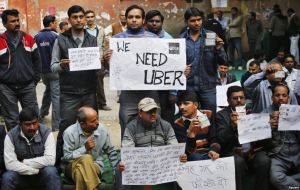It is understandable but surely, at the same time, nonsensical for everybody in a town or city to own their own power tools that are barely used. many of us have far too many books on our shelves, most of which will only be read once. Cars sit on driveways or streets for much of their lives. For some,rooms in their homes remain unused. What a waste!
from The Power of Sharing: A Call to Action for Environmentalists
The Sharing Economy is a description for an amorphous and wide-ranging set of businesses and practices across the world. For the purposes of this discussion I will be looking at the main phenomena associated with the Sharing Economy which have developed over the past ten years or so.
There are three observations I would like to make:
1. A lot of what is called Sharing is not really Sharing.
2. Much of what is claimed to be new about the Sharing Economy is not really new.
3. The Sharing Economy, however defined, is not a solution to the big economic problems we face.
So what aspects of the Sharing economy are not really about sharing. Having friends to stay over on a Saturday night is sharing. Handing them a bill with their breakfast makes me a hotelier. Giving somebody a lift is sharing. Charging them for it makes me a cabbie. Lending somebody a tenner until tomorrow is sharing. Charging them 6% interest for it is usury. None of these things are sharing, they are selling. There is nothing wrong with selling, but I suppose the Selling Economy is a tautology. Indeed, the ultimate form of ‘Sharing’ in this sense would be prostitution, although I do not think the IPO for that is imminent.
Why does the misnomer matter? Because of the moral, environmental and ethical claims that are being made for the Sharing Economy. That somehow it is taking us away from traditional forms of ownership and into a new and more cooperative world. If anything it is taking us in a different direction, towards the monetization of everyday transactions between people and a less communal and more individuated approach to the world, as if we are all involved in a permanent car boot sale of our time, skills and possessions.
What can we say is new about the Sharing Economy? There are undoubtedly some great innovations in consumer services, such as JustParking, which make our lives a little easier. Generally these types of services are the product of the Internet and the capacity for disintermediation that it has brought. But disintermediation is a posh word for cutting out the middle man, and there is nothing very new about that. The Internet has undoubtedly changed things by allowing mass peer to peer connectivity and that has definite consumer benefits. However, the real winners in this have been the pirate capitalists who have moved in and used the technology to break up and disrupt existing industries. This has been and will be the story of capitalism, creative destruction. The Internet driven changes are the latest phase of a centuries old economic system, not the harbinger of a new one.
AirBnB has become hugely successful because it has adopted another old truism of the capitalist economy,sweat your assets, do not leave your house empty. Uber is succeeding partly because it has solved a problem that was fixed a while ago in the heavy transport industry, that is do not have an empty vehicle on the return journey. Peer to Peer lending is a more extensive version of the ‘friends and family’ approach to seed funding entrepreneurs and startups. At present Peer to Peer funding does not appear to be able to address the problem which faces most growing businesses once they have got past the start up phase, the step up funding of 2 to 10 million pounds or more of which there is a huge dearth in this country.
These and other innovations are all largely welcome . But they do not point the way to a different world. They all adapt traditional business methods through the use of new technology,and good luck to them.
Lastly, I would say that however smart and innovative some of these new businesses are, they do not have the potential to solve the big economic problems we face. The Sharing Economy really got going because of the recession and the economic pressures and opportunities it helped to create. But Sharing is operating on the periphery of the global economy, not at its centre. The taxi industry undoubtedly benefited from a one-off productivity increase through Uber and its like. But there appear to be few other major industries which can benefit in the same way from this kind of disruption. Also, in the case of both Uber and AirBnB, they have displaced existing services and therefore not contributed to much extra demand in the broader economy.
There is evidence in the United States, which is more advanced than Europe in the Sharing Economy, that many people have been forced into renting and driving cabs because their wages have stagnated and their living standards fallen. They have been driven, literally in some cases , towards Sharing by austerity. Low productivity in many western economies has led to stagnating wages. Inadequate productive investment by both big businesses and governments has been a major factor in causing low productivity. Until the twin problems of low productivity and inadequate investment are addressed the main sharing that is going on will be sharing out the misery.
(This is a version of a speech delivered to PWC on 19 February 2015)

Leave a comment